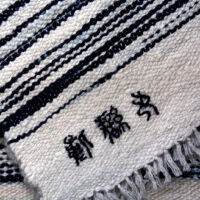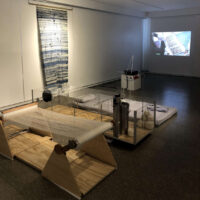BODYecology
Materials
Hand spun merino lambswool, indigo, acrylic, steel, wood, electronics.
Techniques
Spinning, plying, substantive dying, double cloth weaving. In contemporary culture we are facing a sleep crisis. The apparent acceleration of modernity is one in which everything is speeding up and there are always better things to do than sleep. This is an attention economy but we like to think that we are choosing to consume. The impulse is to consume our own insomnia through the customisation of sleep to work around deadlines or lifestyles. Our sleep cycles are no longer in tune with diurnal time – 24/7 electric light, neon cityscapes and the proliferation of electronic screens stimulate us to stay up late at night and every morning the mechanised time of our alarm clocks wake us, then on weekends we binge on sleep to catch up.
‘Social jet-lag’[1] is the result of this ongoing conflict between biological and social time that takes its tole on the body and manifests in many health issues. Research has linked sleep to memory, learning, metabolism and the immune system. Sleep deprivation leads to health consequences such as obesity, hypertension, diabetes and cancer, and is linked to diseases such as chronic heart failure, chronic obstructive pulmonary disease and alzheimer’s disease.[2] Somewhere at a deeper level, our hermeneutic goal is to return to healthy sleep but the healthy sleeper is not one revered in our culture. Critical sleep theory considers the history of sleep culture and acknowledges its problematic contemporary condition, one in which the industrial revolution had the effect of mechanising time as labour was commodified into productive and non-productive time. Before this we slept in different ways, in medieval times in shorter blocks of three or four hours rather than eight hours a night. Sleep is considered a weakness that overcomes us. We embrace a work ethic that only sees value in productivity and places taboo on sleeping in public. Homer called sleep ‘deaths brother’.
BODYecology is an installation that generates bespoke blankets from sleeping participants. Humanistic intelligence is the term used by Steve Mann to describe the synergy between human and computing systems, where both operate as if one organism, circumventing any conscious operative narrative. In BODYecology the sleeping state at night determines the depth of colour of a hand spun merino lambswool thread that is drawn at a constant rate across a portable dying machine, when soundly asleep the thread dives deeply into the indigo dye bath, when lightly sleeping or stirring it is shallow or skims the surface. In the day the resulting variegated coloured thread is woven into a blanket, a physical embodiment of the ontological experience of sleep. Each blanket is generated through the process over approximately a month of sleeping and weaving.
Endnotes
- Till Roenneberg Roenneberg, T., Allebrandt, K., Merrow, M., Vetter, C.: Social jetlag and obesity. Current Biology 22(10), 939–943 (2012), doi:10.1016/j.cub.2012.03.038.
- 2. Puzzuoli, S., Marcheschi, P., Bianchi, A.M., Mendez Garcia, M.O., De Rossi, D., Landini, L.: Remote Transmission and Analysis of Signals from Wearable Devices in Sleep Disorders Evaluation.

